 College girls call for protection of ecological space on earth
College girls call for protection of ecological space on earth
 Top 10 celebrities driving auto brands
Top 10 celebrities driving auto brands
 10 low-carbon tips to save money
10 low-carbon tips to save money
 Luxury cars make Asia premiere at Auto China
Luxury cars make Asia premiere at Auto China
 Versatile dog
Versatile dog
 Ni Ni covers BAZAAR JEWELRY
Ni Ni covers BAZAAR JEWELRY
 Cherry blossoms reach peak bloom in Washington D.C.
Cherry blossoms reach peak bloom in Washington D.C.
 Top Chinese fashion icons in foreigners' eyes
Top Chinese fashion icons in foreigners' eyes
 Asia's largest business aviation exhibition to be held in Shanghai
Asia's largest business aviation exhibition to be held in Shanghai
 World's top-rated luxury hotels
World's top-rated luxury hotels
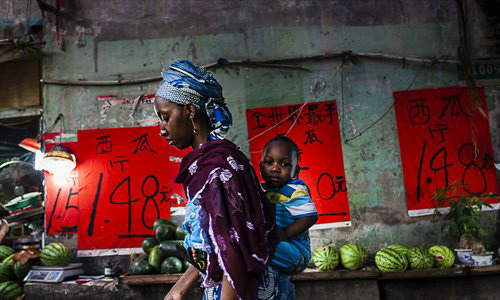 |
| An African woman walks with a baby on her back. In a stretch of less than 200 meters of the Baohan Zhijie commercial district, there are two 300-square-meter supermarkets, one fish and meat market, and many open fruit stalls like this.(Li Dong/GT) |
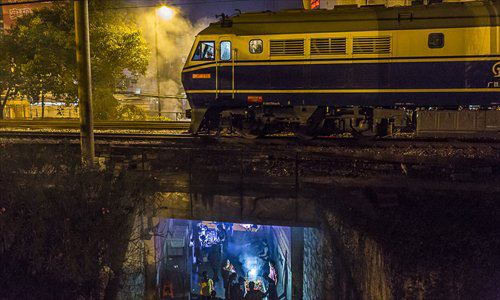
A tunnel that leads to "African Street" in Guangzhou. Named Baohan Zhijie, this street is the main area of the "village inside the city" in Yuexiu district. It lies just hundreds of meters from the Guangzhou government headquarters. (Li Dong/GT)
More Photos of Africans in Guangzhou
The emergence of an "African street" in Guangzhou, Guangdong Province, was a very unusual phenomenon for China. In the 1980s and 1990s, people told stories about Chinese heading abroad to make a living overseas, but 30 years later immigrants are flocking into China as well. To many Chinese people, the emergence of the African street is like a mirror image of the Chinatowns in other countries.
Baohan Zhijie, located at the center of Guangzhou, is the most concentrated street for black people in the city, because of its convenient location. For Africans who have just arrived in Guangzhou, the advantages can be easily seen as shopping malls, wholesale markets, subway stations and hotels surround the area.
In the 1980s, Muslims from Ningxia Hui Autonomous Region and Xinjiang Uyghur Autonomous Region started bringing Arab merchants to the area. Starting in the 1990s, the first African merchants opened shops on the street. Then more and more came into the city, most working in international trade, involved in shipping Chinese-made products to Africa. Languages can be heard from the Middle East, South Asia, South America and Africa. Some are even from Australian aboriginal groups. Legal residents add up to more than 20,000 and illegal residents range from 100,000 to 200,000 according to different sources.
The street is calm during the day, not different from any other street in Guangzhou. It comes alive at 4 pm and doesn't end till around 3 am. Residents start to fill the street. It serves as a place for a temporary stay for many new immigrants. It's difficult for Africans to get a business visa in China and many run out of time without finding a business opportunity.
It's difficult to catch them on camera lens, said the photographer, because many worry the exposure will attract police and draw attention to passport and visa issues. They also worry about their image being misused. 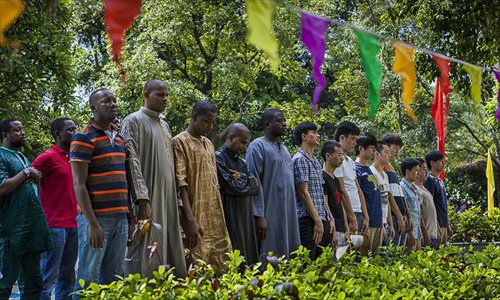
The Xianxian Mosque in Guangzhou is also located near Baohan Zhijie. Africans and local Muslims participate in religious services in the mosque garden for Balram in August, 2013. (Li Dong/GT)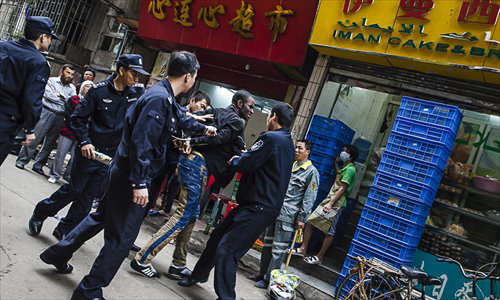
In one of many daily patrols, the police catch an immigrant with passport issues.(Li Dong/GT)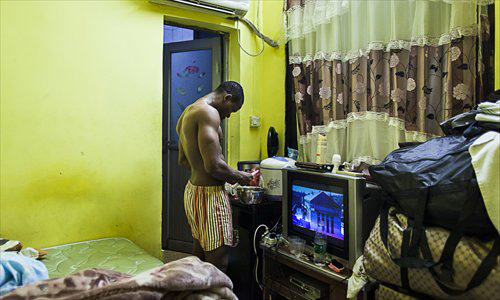
Tanzanian merchant Pablo prepares dinner in his 12-square-meter room. The rent is 1,200 yuan, not including water and electricity, a common price for foreigners in this area. (Li Dong/GT)
 4th Beijing Int'l Film Festival ends
4th Beijing Int'l Film Festival ends Commando elite specializes in sign language
Commando elite specializes in sign language Man photoshops himself into girlfriend's childhood photos
Man photoshops himself into girlfriend's childhood photos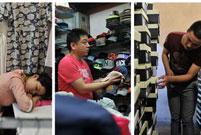 Photo story: Stallholders at Beijing Zoo Wholesale Market
Photo story: Stallholders at Beijing Zoo Wholesale Market Artists on backstage
Artists on backstage Beckham launches fund to support youth soccer in China
Beckham launches fund to support youth soccer in China Cherry blossoms hit peak bloom in Washington D.C.
Cherry blossoms hit peak bloom in Washington D.C. Children in ancient costumes learn Zhusuan
Children in ancient costumes learn Zhusuan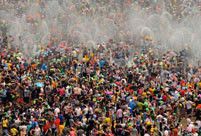 Tens of thousands celebrate Water Splashing Festival
Tens of thousands celebrate Water Splashing Festival Giant panda Sijia is back to happy life
Giant panda Sijia is back to happy life Richest Chinese of 2014: half from the mainland
Richest Chinese of 2014: half from the mainland Chengdu - laid-back lifestyle makes happiest city
Chengdu - laid-back lifestyle makes happiest city The backstage of the Fashion Week
The backstage of the Fashion Week College students in Han costumes
College students in Han costumes Postgraduate works as waitress
Postgraduate works as waitressDay|Week|Month